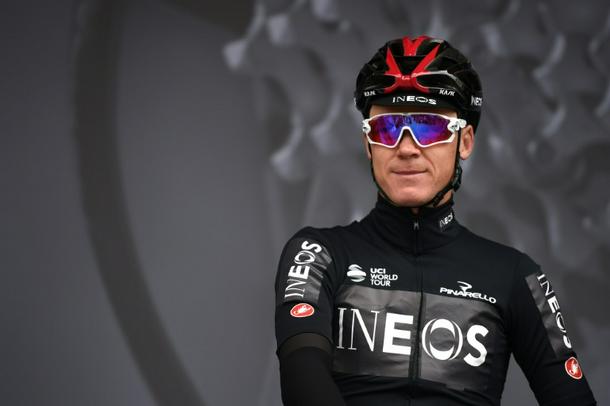
Chris Froome has extensive injuries after a high-speed crash
Saint-Étienne (France) (AFP) - Four-time Tour de France winner Chris Froome has undergone a successful four-hour operation following a devastating crash and could be back racing in six months, his surgeon said Thursday.
Froome was airlifted to hospital in Saint Etienne for emergency surgery after slamming into a wall at high speed during practice on Wednesday ahead of the fourth stage of the Criterium du Dauphine race in central France.
The force of the impact fractured his pelvis, right femur, and left him with broken ribs and a broken right elbow.
“The operation was long, almost four hours, but it went very, very well,” said Remi Philippot, chief surgeon for sports trauma at Saint-Etienne hospital.
He said the good news was that the high-impact crash had caused no neurological or head trauma and he expected Froome would be back in the saddle in six months.
“The impact was at around 50 km/h, with very little body protection, causing a high-energy impact,” said Philippot, who spoke to Froome Thursday morning for one hour.
“Chris Froome has the morale of a winner and is very rapidly bouncing back.
“He started asking immediately when he could get back on his bike. He should be back racing in about six months,” said Philippot.
He personally operated on the compound fracture to the femur while Giorgio Gesta, an orthopaedic surgeon and former Italian hockey international, worked on fractures to the right elbow.
Philippot said the 34-year-old Briton would remain in intensive care for 48 hours before being authorised to move to a unit specialising in rehabilitation.
Froome’s Ineos team principal Dave Brailsford said his star rider had the mental force needed in the battle for recovery that lay ahead.
“One of the things which sets Chris apart is his mental strength and resilience - and we will support him totally in his recovery, help him to recalibrate and assist him in pursuing his future goals and ambitions.”
The team will nevertheless be without their key rider for the Tour de France next month after the horror crash which happened on a downhill stretch of road in the Loire region.
- Dead stop -
Froome was riding with Dutch teammate Wout Poels when he lost control of his bike and slammed into the wall of a house at full speed.

The ambulance in which Chris Froome was treated after his crash
“We have had a look at his data, he went from 54km/h to a dead stop,” Brailsford said.
The accident happened in the village of Saint-Andre d’Apchon. Froome had taken his hands off the handlebars in order to blow his nose “and the wind’s taken his front wheel and he’s hit a wall,” Brailsford added.
Following treatment at the scene Froome was airlifted to intensive care at Saint-Etienne hospital.
Froome’s wife Michelle Cound tweeted that she was on her way to join him there and asked fans to keep the rider “in your thoughts.”

Chris Froome being airlifted from hospital in Roanne to St Etienne after his horrific crash
Brailsford said Froome had worked “incredibly hard to get in fantastic shape and had been on track for the Tour” which starts on July 6 from Brussels. The Criterium du Dauphine represents a full dress rehearsal and Froome was doing well, in eighth spot before the crash.
Tour de France director Christian Prudhomme said Froome’s absence was a blow to the 2019 edition of cycling’s biggest stage race.

Rescue workers with Froome on a stretcher on his arrival at hospital
“The Tour de France won’t be the same without him. Chris Froome has been the central character at the Tour since 2013,” he said.
Froome had started the year in low-key form. He trailed in 91st in the Tour of Colombia, 94th at the Tour of Catalonia, 11th in the Tour of the Alps and 13th at the Tour de Yorkshire.
The Kenyan-born Froome, who at his best combines top level time-trialling skills with a fearsome prowess for climbing, first won the Tour in 2013 with Team Sky.
He went on to win the Tour de France again in 2015, 2016 and 2017. He also won the 2017 Vuelta a Espana and the 2018 Giro d’Italia, making him the greatest Grand Tour rider of his generation.